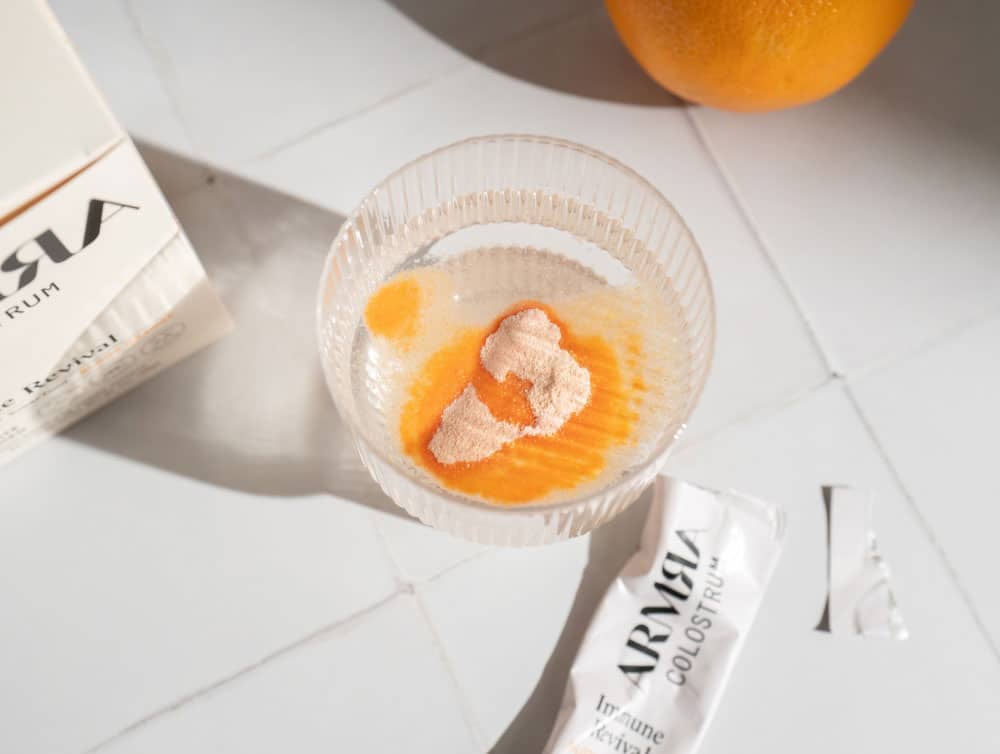
It’s in our nature to trust our gut, but how well can you trust something you don’t really know?
When we talk about gut health, the microbiome tends to steal the spotlight. However, the truth is that maintaining a healthy gut involves the intricate interplay of all four layers of the gut wall barrier – that’s right, there are four distinct layers you need to be aware of.
Why?
Because if there is disruption in any of these layers, harmful particles can enter the body and trigger inflammation, leading to various health issues[1][2].
On the other hand, caring for and fortifying these layers supports a healthy microbiome and optimizes cellular pathways throughout – leading to whole-body health. From hair growth and radiant skin to a strengthened immune system, revved metabolism, and improved energy and focus, when your gut is happy and healthy, so are you.
So, what are the four layers of your gut barrier? The microbiome, the mucosal layer, the gut cell architecture, and the ever-vigilant immune cells and antibodies that patrol your gut.
Let’s explore each layer in more detail and then discuss how you can best support their unique structures and functions.
The Four Layers of Your Gut Barrier
#1. The Microbiome
Despite only being named in 2001, the microbiome is undeniably one of the most discussed aspects of gut health. Composing a vast array of microorganisms, including bacteria, archaea, viruses, and fungi, it’s a dynamic environment that influences everything from our digestion and nutrient absorption to our hormones, immune system, and mood[3].
However, like any delicate ecosystem, the microbiome requires balance and is heavily influenced by our lifestyle, including what we eat, drink, and even our stress levels. Disruptions in our microbiome are associated with chronic inflammation, mood disorders, increased cravings and appetite, and decreased immune health[4]. Tending to your microbiome is one key part of unlocking optimal physical and psychological health.
#2. The Mucosal Layer
Our mucosal layer plays an indispensable role in gut health. It acts as a scaffolding system for our microbiome and a sticky, physical barrier that traps bacteria, viruses, and allergens. It also houses crucial components of our immune system, like anti-microbial and enzymes[1][2].
Immune cells and antibodies within the mucosal layer help neutralize potential threats, ensuring a first line of defense against invaders. Without this protective layer, harmful agents can penetrate more easily, leading to inflammation and a host of common health issues. This not only affects the gut but may also have a ripple effect on the entire body[5]. Therefore, maintaining a healthy mucosal layer isn’t just about protection – it’s foundational to our overall health.
#3. Immune Cells and Antibodies
If your gut wall is your fortress, your immune cells and antibodies are your army. Your immune cells and antibodies are the dedicated guards, with a whopping 80% of your body’s immune cells stationed along this protective barrier[6].
Together, these immune cells and antibodies take on a crucial role: they team up to identify, neutralize, and eliminate harmful invaders. These may include defending against pathogens and foreign particles from the environment or shielding your body from infections and toxic substances. This collaborative effort between antibodies and immune cells is vital; an uncoordinated response leaves your body vulnerable, potentially leading to frequent illnesses, chronic inflammation, and a host of modern, chronic diseases.
And just like any guard can get tired, these immune protectors can weaken or begin to misfire, especially with challenges like inflammation, ongoing stress, or after battling an illness, which can set a negative cycle in motion[6-7].
That’s why keeping them strong and ready is crucial — they’re a big part of what keeps us healthy.
#4. Gut Cell Architecture
The final layer between our environment and our bloodstream is the physical barrier of our gut cell layer. This one-cell-layer-thick barrier carefully picks and chooses what gets admitted into the body.
This layer is essential for digestion and nutrient absorption, so maintaining its integrity is paramount. Modern-day threats, such as a Western diet (laden with processed ingredients, sugars, and refined carbohydrates), chronic stress, and chemical exposures from the environment, can influence the integrity and function of this barrier. Disruption of this layer’s integrity can allow “holes” to develop, allowing things to pass through the bloodstream unchecked[8].
The disruption of this particular layer is known as intestinal gut permeability, sometimes termed leaky gut in functional health circles. Disrupted gut barriers can perpetuate inflammation and illness by letting harmful substances enter the bloodstream, triggering the immune system inappropriately[6]. Poor diet, uncontrolled stress, and lack of exercise can negatively affect gut health, increasing this risk.
Ways To Support Total Gut Health
When trying to heal your gut, it’s essential to ensure you’re not just focusing on one part of the four-part story. Embracing a holistic approach means addressing each part of the gut barrier.
Here’s a breakdown of some supportive strategies for comprehensive gut health:
Nourishing the Microbiome with Whole Food Prebiotics:
What are they? Prebiotics are non-digestible foods that boost the growth of beneficial gut bacteria, like Bifidobacterium, Lactobacillus, and Akkermansia. Instead of attempting to introduce new bacteria, as in the case of probiotics, prebiotics bolster existing beneficial ones.
Why are they important? A flourishing microbiome generates nutrients, specifically small-chain fatty acids (SCFAs). These SCFAs are instrumental in sustaining a healthy mucus layer, nourishing the epithelial cell layer or gut wall barrier, AND ensuring the immune system functions optimally[8].
Consuming Antioxidant-Rich Fruits and Vegetables:
What are they? These are foods abundant in phytochemicals such as polyphenols and flavonoids. Notable substances specifically include anthocyanins in berries and apples and resveratrol in grapes.
Why are they beneficial? Phytochemicals fortify immunity and gut health. Plus, the high antioxidant content in these foods offers cellular protection, preventing cellular damage and supporting our epithelial cell layer and immune cell layer[8].
Bovine Colostrum:
What is it? Colostrum is the first nutrition we, and all mammals, receive in life. Colostrum, traditionally bovine-sourced, is packed with over 400 bioactive nutrients, including antibodies, prebiotics, regenerative peptides, growth factors, antioxidants, and antimicrobials that can’t be found in any other natural source.
Why is it beneficial? Bovine colostrum serves as a direct source of antibodies like IgG and sIgA that repopulate the immune cell layer of the gut. These antibodies intercept and neutralize harmful particles and help support the immune system.
But that’s not all; some of the other beneficial components of colostrum include:
- Regenerative peptides and growth factors that solidify the gut cell structure, aiding in rebuilding and strengthening the gut wall barrier to protect it against disruption. This is vital for nutrient absorption and safeguarding against pathogens and inflammation.
- Whole food prebiotics, called milk oligosaccharides, which strictly feed the healthy Bifidobacteria, and are known to support the microbiome, immune system, mucus layer, and gut cell wall[9-10]. This effectively reduces the need for additional prebiotic and probiotic support.
- Powerful antioxidants, like PQQ, glutathione, and lactoperoxidase, which further support immunity, cellular health throughout the gut and body, and the microbiome. In essence, bovine colostrum serves as a safe and comprehensive option for complete gut health[11-13].
Note: When looking for bovine colostrum, quality is key.
What should you look for?
Choosing clean, ethically sourced, grass-fed, and defatted bovine colostrum is vital. Products like physician-founded ARMRA Colostrum are exemplary in this regard.
Takeaway
As we continue to learn more about gut health and its wide-ranging effects on our entire body, it’s essential that we stay up to date on all the latest findings. While the microbiome is astounding in its capacity to maintain and optimize our health, there is much more to the story than gut microbes alone.
Nutrient-rich whole foods and high-quality supplements can often do much more for us than simply popping a probiotic now and then. When you make gut health a holistic effort, you’ll see holistic benefits.
References
- Giery?ska M, Szulc-D?browska L, Struzik J, Mielcarska MB, Gregorczyk-Zboroch KP. Integrity of the Intestinal Barrier: The Involvement of Epithelial Cells and Microbiota-A Mutual Relationship. Animals (Basel). 2022;12(2):145. Published 2022 Jan 8. doi:10.3390/ani12020145
- König J, Wells J, Cani PD, et al. Human Intestinal Barrier Function in Health and Disease. Clin Transl Gastroenterol. 2016;7(10):e196. Published 2016 Oct 20. doi:10.1038/ctg.2016.54
- Hou, K., Wu, ZX., Chen, XY. et al. Microbiota in health and diseases. Sig Transduct Target Ther 7, 135 (2022). https://doi.org/10.1038/s41392-022-00974-4
- Madison A, Kiecolt-Glaser JK. Stress, depression, diet, and the gut microbiota: human-bacteria interactions at the core of psychoneuroimmunology and nutrition. Curr Opin Behav Sci. 2019;28:105-110. doi:10.1016/j.cobeha.2019.01.011
- Paone P, Cani PD. Mucus barrier, mucins and gut microbiota: the expected slimy partners?Gut 2020;69:2232-2243.
- Wiertsema SP, van Bergenhenegouwen J, Garssen J, Knippels LMJ. The Interplay between the Gut Microbiome and the Immune System in the Context of Infectious Diseases throughout Life and the Role of Nutrition in Optimizing Treatment Strategies. Nutrients. 2021;13(3):886. Published 2021 Mar 9. doi:10.3390/nu13030886
- Tsounis EP, Triantos C, Konstantakis C, Marangos M, Assimakopoulos SF. Intestinal barrier dysfunction as a key driver of severe COVID-19. World J Virol. 2023;12(2):68-90. doi:10.5501/wjv.v12.i2.68
- Liang L, Saunders C, Sanossian N. Food, gut barrier dysfunction, and related diseases: A new target for future individualized disease prevention and management. Food Sci Nutr. 2023;11(4):1671-1704. Published 2023 Mar 7. doi:10.1002/fsn3.3229
- Bagwe-Parab S, Yadav P, Kaur G, Tuli HS, Buttar HS. Therapeutic Applications of Human and Bovine Colostrum in the Treatment of Gastrointestinal Diseases and Distinctive Cancer Types: The Current Evidence. Front Pharmacol. 2020;11:01100. Published 2020 Sep 11. doi:10.3389/fphar.2020.01100
- Dziewiecka H, Buttar HS, Kasperska A, et al. A Systematic Review of the Influence of Bovine Colostrum Supplementation on Leaky Gut Syndrome in Athletes: Diagnostic Biomarkers and Future Directions. Nutrients. 2022;14(12):2512. Published 2022 Jun 17. doi:10.3390/nu14122512
- Jonscher KR, Rucker RB. Pyrroloquinoline quinone. Dietary Interventions in Liver Disease. Published online February 8, 2019:157-173. doi:10.1016/b978-0-12-814466-4.00013-6?
- Lee A, Pontin MCF, Kosmerl E, Jimenez-Flores R, Moretti DB, Ziouzenkova O. Assessment of adipogenic, antioxidant, and anti-inflammatory properties of whole and whey bovine colostrum. J Dairy Sci. 2019;102(10):8614-8621. doi:10.3168/jds.2019-16509
- Sienkiewicz M, Szyma?ska P, Fichna J. Supplementation of Bovine Colostrum in Inflammatory Bowel Disease: Benefits and Contraindications. Adv Nutr. 2021;12(2):533-545. doi:10.1093/advances/nmaa120













